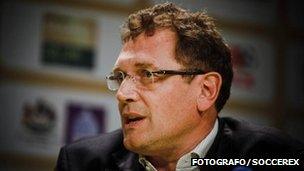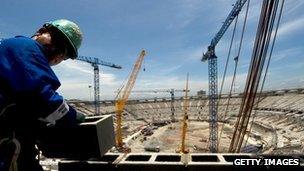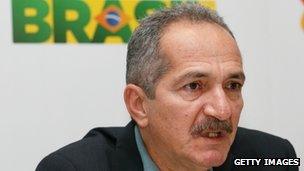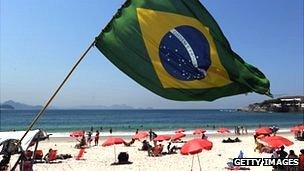Fifa and Brazil kiss and make up before 2014 World Cup
- Published

Brazil will host the Confederations Cup in just over six months
As most married couples will admit, sometimes the relationship can have its problems.
That's the opinion of Jerome Valcke, the secretary general of Fifa, world football's governing body.
Yet Mr Valcke was not talking about his own marital relations; he was instead using an analogy to describe Fifa's somewhat strained relationship in recent years with Brazil, which will be hosting the next World Cup in 2014.
Put simply, Fifa - and especially Mr Valcke - has said on a number of occasions that it was concerned that Brazil might not be ready on time.
Mr Valcke even went as far earlier this year as saying that Brazil "needed a kick up the backside".
With Brazilians - and especially their government - quick to be offended by criticism from overseas, Mr Valcke's comments caused something of a diplomatic incident.
'Pointless fighting'
Mr Valcke - who is the Fifa official charged with working with Brazil to ensure that the 2014 World Cup goes ahead without a hitch - may have realised that he went a bit far with his comment, as he has been on something of a charm offensive with Brazil ever since.

Mr Valcke has Fifa and Brazil are unable to get "a divorce"
Visiting Rio de Janeiro to address Soccerex, the global football finance and business convention, he said he now expected that all 12 new and extensively renovated World Cup stadiums across Brazil would be ready on time.
He added that the six grounds also hosting next summer's Confederation Cup - a tournament involving eight nations that is essentially being used as a practice run for the World Cup - would also be ready in time for that, even if some push it a bit fine.
"We [Fifa and Brazil] have found a way to work together," said Mr Valcke.
"We are not going to fight anymore because it is pointless. We are a couple, we have to live together from the moment the envelope was opened [revealing that Brazil would host the 2014 World Cup], until the end of the games.
"We are a couple who can't get divorced."
'Swiss-German' outlook
Where Mr Valcke said concerns remained was regarding whether the wider infrastructure work would be ready on time - everything from extending Brazil's airports, to new public transport, and sufficient hotels.
Yet this time, Mr Valcke's concerns were delivered with a smile and a joke.

Work continues on the Maracana but there is squabbling over who will operate it when rebuilt
"In one unnamed city there are 17,000 hotel bedrooms and a 45,000 capacity stadium [for the World Cup]," he said.
"I would say that something is not quite right. The only solution would be to put three people in the same bed."
Mr Valcke even went on to joke that Fifa was too "Swiss-German" in its outlook, which he described as an obsession with "rules and regulations".
With Brazil committing $15bn (£9.4bn) on World Cup stadiums and infrastructure - most commentators agree with Mr Valcke that while the grounds will all be finished, many of the infrastructure upgrades won't be ready.
'Development' promise
Yet Brazil's Sports Minister Aldo Rebelo, who also addressed the Soccerex convention, chose not to discuss whether the country would meet all of its World Cup deadlines.
Instead Mr Rebelo, a leading member of Brazil's Communist Party, used a short speech to focus on the economic and social legacy the country hoped to achieve from the World Cup.

Mr Rebolo has high social hopes around the 2014 World Cup
"Football brings us a promise of development, a fairer distribution of income, a window of social inclusion, a process of widening the GDP, of sport creating income, jobs and taxes, of upgrading Brazilian society through football," he said.
An official from Mr Rebelo's department later said that the government now estimates that the World Cup would boost the Brazilian economy by $90bn by 2020.
Meanwhile, the governor of Rio de Janeiro state, Sergio Cabral, used his speech to attack Brazilian football clubs, which he said were "unprofessionally run".
A Brazilian sports journalist later explained that his comments were in regard to a spat he has with the main football teams in Rio - Vasco da Gama, Botafogo, Flamengo and Fluminense.
All four often play games at Rio's giant Maracana Stadium, and when it reopens following modernisation, they are said to want a bigger role in how it is run.
The stadium is owned by Rio de Janeiro state, and Mr Cabral is said to not wish to relinquish any control over it.
'Sceptical'
With Brazil expecting a lasting economic boost from the World Cup, one area in which it believes it will achieve this is through an increased number of overseas visitors.

Brazil expects the World Cup and 2018 Olympics to give the country a major tourism boost
Marcelo Pedroso, director of international markets at Embratur, the Brazilian tourist board, said that it predicts that thanks to both the 2014 World Cup and 2016 Olympics in Rio the number of overseas tourists visiting Brazil will rise from 5.4 million per year in 2011 to 10 million by 2020.
"One of the strongest legacies we will receive will be in tourism," he said.
"The two events are a once-in-a-lifetime opportunity to promote the country."
Wilber Colmeraurer, managing director of private company Brazil Funding, which advises companies that wish to invest in Brazil, said that while the country was benefiting from increased transport spending ahead of the World Cup, the government was ignoring other vital infrastructure improvement needs.
"In addition to new stadiums, Brazil needs more electricity generation, there are real bottlenecks in the energy network that need to be resolved. But in that regard I am sceptical."
Fifa's Jerome Valcke might no doubt agree, but on current form he would no doubt voice his concerns very politely.